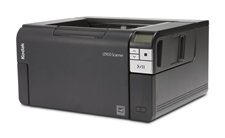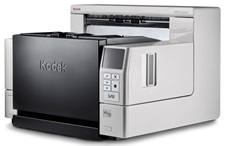Streamlined logistics for retail
A decentralized scanning system that’s easy to use reduces staff training time and makes getting documents faster
Started as a family business over 185 years ago, Globus is one Germany’s largest retailers. Throughout this long history, the company reinvented itself several times and for over two decades digitization has played an important role in Globus’ evolution.
Globus is headquartered in St. Wendel where Franz Bruch opened a grocery store in 1828 that would ultimately become the Globus retail chain of hypermarkets, Globus Drive stations (order online and choose one of the pick-up locations), electronic stores and DIY stores.
A digital document management pioneer
With presences in three countries (Germany, Russia and the Czech Republic), innovative ideas and efficient processes are key in the company’s strategy to thrive in the highly competitive retail segment.
Globus started creating an electronic archive in 1996, digitizing business-critical paper documents and thus being a pioneer in digital document management. Initially, the company started with a centralized approach.
The retailer has three production scanners (Kodak i4000 series) and a scanner for daily operations in its headquarters. In this centralized mailroom environment, all incoming documents such as invoices, contracts and other correspondence got scanned and processed.
Moving from centralized to decentralized capture
Now, Globus switched to a decentralized document scanning model in its 46 hypermarkets and in the logistics centre to save time and money.
Delivery notes get scanned on the spot. To achieve this, each location is equipped with space-saving Kodak i2900 scanners. Everything is supported by custom-made scanning software in the Microsoft .NET environment.
The essential reasons why Globus decided to opt for a decentralized model include cost-saving (documents are scanned and turned into digital information at the point of entry), time-saving, less “pressure” on the central office, process optimisation and increased productivity as data is available much faster.
More organisations chose a decentralized/distributed scanning approach but of course there is no one-size-fits-all answer to the question whether to go for centralized or decentralized. There are many parameters and as always, the individual context and goals matter.
In the case of Globus the motivations are clear. Getting documents faster in the business processes, no need to ship documents (and in that process maybe even lose documents), faster processes, etc.
With scanners that enable to digitize high volumes while having a small footprint, it turns out to be a perfect fit for the retail company. An important element to consider is ease of use, thus reducing the time needed to train the staff in multiple locations, one of many reasons why Globus picked Kodak Alaris.
Markus Bölinger, who is responsible for document management at the company’s St. Wendel headquarters explains his choice for scanners from Kodak Alaris: “We have been an early mover in digitisation and have acquired a lot of know-how, also regarding scanning. After tests, the scanners from Kodak Alaris stood out as being most robust and reliable”.
To ensure business continuity, Globus also signed up for a services contract.
Related solutions

i2900 Scanner
- Up to 60 ppm color/ bw
- Book-edge flatbed scanner built-in
- Customizable User Interface

i4850 Scanner
160 ppm | Automatyczny podajnik dokumentów na 500 arkuszy- Nasz najszybszy kompaktowy skaner produkcyjny
- Intuicyjny kolorowy ekran o przekątnej 3,5 cala (89 mm)
- Surepath™ inteligentna technologia podawania dokumentów
- Cyfrowe i amp; fizyczne opcje nadruku
ABOUT THE ALARIS DIVISION OF KODAK ALARIS
Kodak Alaris is a leading provider of information capture and intelligent document processing solutions that simplify business processes. We exist to help the world make sense of information with smart, connected solutions powered by decades of image science innovation. Our award-winning software, scanners, and professional services are available worldwide and through our network of channel partners.
Partners
Privacy Notice | Legal / Site Terms | California Notice at Collection | Do Not Share My Personal Information
© 2024 Kodak Alaris Inc. TM/MC/MR: Alaris, ScanMate. All trademarks and trade names used are property of their respective holders. The Kodak trademark and trade dress are used under license from Eastman Kodak Company.